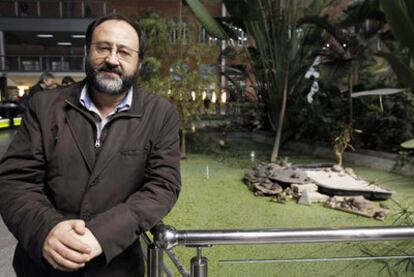Reckoning with the raccoon
A new documentary reveals how invasive species are upsetting Madrid's ecosystem
Buying cute little raccoons as pets was once something of a fad. But as this animal grows into an adult, it attains a sexual maturity that, if unsatisfied, turns into aggression. Basically, they start biting you. At that point the raccoon is usually released, and left to fend for itself in the countryside, something it does all too well.
A plague of raccoons, as some experts have termed their burgeoning population, has spread through the valleys of the Río Jarama and the Río Manzanares near Madrid, including municipalities such as Rivas Vaciamadrid, Arganda and San Martín de la Vega.
The raccoon, Procyon lotor ("doglike washer"), is famous for its curious habit of dousing its food in water?at least in captivity. This behavior, it seems, has not been observed in the wild, and may be an instinctive "vacuum activity" (such as a squirrel in a cage going through the motions of burying a non-existent nut in a non-existent hole), which mimics the act of catching crabs or fish at the edge of a stream, since these figure largely in the raccoon's natural diet.
"The recovery of the lynx is probably being slowed by the advance of raccoons"
The word "raccoon" in English, and mapache in Spanish, both come from Native American languages, in Virginia and Mexico respectively. The washing habit determines its name in other European languages, such as the French raton laveur ("washer rat") or the German Waschbär ("wash-bear"). The raccoon, however, is neither a rat nor a bear. It occupies a genus of its own, and is distantly related to weasels.
One man who is keeping an eye on the raccoon "plague" around Madrid is the naturalist Luis Miguel Domínguez. He is the man behind Invasores (invaders), a documentary about biological invasions in the Madrid region, where there are now around 20 species of exotic animals and plants (420 throughout Spain) that are creating significant disturbances in biodiversity. The American crab, the Argentinean Monk Parakeet, the geranium butterfly and the Florida turtle are all gaining ground every day.
"It's no joke," says Domínguez, whose film will be vying for a prize at the upcoming Goyas, Spain's answer to the Academy Awards. "The raccoon, for example, should never be considered a pet. They live in large groups, they attack a lot of animals, and they eat just about anything, including carrion, garbage and birds. The recovery of the Iberian lynx is probably being slowed by the advance of raccoons, because they are not compatible," says Domínguez in the Atocha railway station.
We have come here because of the pool in the station's covered garden, which is swarming with thousands of Florida turtles. "This is a crying shame," he says. "In the US the sale of these animals is prohibited because they transmit salmonellosis, but here they allow people to let them loose in this pool, where they reproduce without any control."
The state company in charge of the station, Adif, admits that the location is not ideal for the turtles, which can live as long as 90 years. "It's not a situation we wanted," a spokesperson says. "But we have assumed the care of these animals. There is a biologist in charge of making sure that the tank is in a suitable state, and that they have enough to eat."
Domínguez used to run a 24-hour collection service for people who bought exotic animals, tired of them, and then decided to give them away or let them loose. It was called Exotarium, and operated with a 100,000-euro budget from the regional government, which was recently cut off. He says that regional leader Esperanza Aguirre "left us in the lurch." The problem, he says, is still there. "Their attitude is utterly irresponsible. It shows they have no interest in the environment."

Tu suscripción se está usando en otro dispositivo
¿Quieres añadir otro usuario a tu suscripción?
Si continúas leyendo en este dispositivo, no se podrá leer en el otro.
FlechaTu suscripción se está usando en otro dispositivo y solo puedes acceder a EL PAÍS desde un dispositivo a la vez.
Si quieres compartir tu cuenta, cambia tu suscripción a la modalidad Premium, así podrás añadir otro usuario. Cada uno accederá con su propia cuenta de email, lo que os permitirá personalizar vuestra experiencia en EL PAÍS.
¿Tienes una suscripción de empresa? Accede aquí para contratar más cuentas.
En el caso de no saber quién está usando tu cuenta, te recomendamos cambiar tu contraseña aquí.
Si decides continuar compartiendo tu cuenta, este mensaje se mostrará en tu dispositivo y en el de la otra persona que está usando tu cuenta de forma indefinida, afectando a tu experiencia de lectura. Puedes consultar aquí los términos y condiciones de la suscripción digital.








































